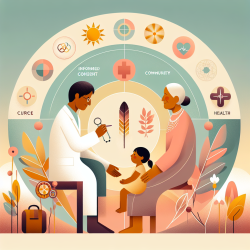In the realm of child health research, especially within Indigenous communities, obtaining informed consent is not just a procedural requirement but a culturally nuanced process that demands sensitivity and respect for community values and protocols. The recent scoping review titled "Culturally appropriate consent processes for community-driven indigenous child health research" sheds light on how practitioners can improve their skills by embracing culturally appropriate consent practices.
The Importance of Culturally Appropriate Consent
Consent processes in research involving Indigenous children have historically been fraught with challenges. The standard requirement for active or signed parental consent often leaves Indigenous children with limited access to research opportunities and health screenings. This disparity underscores the need for culturally safe consent processes that honor the rights of Indigenous children, their families, and community protocols.
Key Recommendations from the Research
- Addressing Ethical Tensions: The study highlights tensions between Western Research Ethics Board (REB) requirements and Indigenous cultural values. Practitioners should strive to balance these by respecting collective decision-making traditions inherent in Indigenous communities.
- Embracing Wise Practices: Wise practices include allowing parents and children to consent together, land-based consenting, and involving communities in decision-making. These practices foster trust and ensure that consent processes are aligned with community values.
- Relational Approaches to Consent: Building relationships with community members is crucial. Practitioners should engage with Elders and community leaders early in the process to gain their trust and approval, which can facilitate smoother consent processes.
Implementing Culturally Safe Consent Practices
For practitioners looking to implement these insights into their work, it is essential to recognize that Indigenous communities are not monolithic; each has its own unique customs and protocols. Therefore, flexibility and adaptability are key.
Community Engagement: Engage with community members from the outset. This includes consulting with Elders and leaders to understand the specific needs and preferences of the community regarding consent processes.
Cultural Sensitivity Training: Practitioners should undergo training to understand the cultural context of the communities they work with. This training should cover language use, cultural protocols, and historical contexts that may impact how consent is perceived.
Flexible Consent Options: Offer multiple modes of consent, including oral or written options, technology-based methods like texting or emails, and culturally significant practices such as offering tobacco or conducting land-based gatherings.
The Path Forward: Encouraging Further Research
The scoping review identifies a significant gap in literature focusing on Indigenous consenting practices specifically for children. Practitioners are encouraged to contribute to this field by conducting further research that explores the nuances of Indigenized consent processes. Such efforts will not only enhance our understanding but also support equitable access to research opportunities for all Indigenous children.










